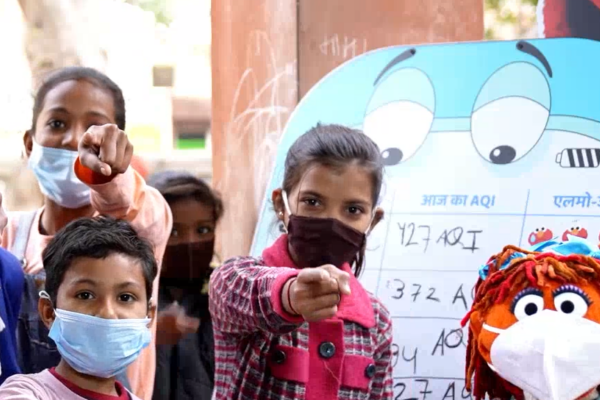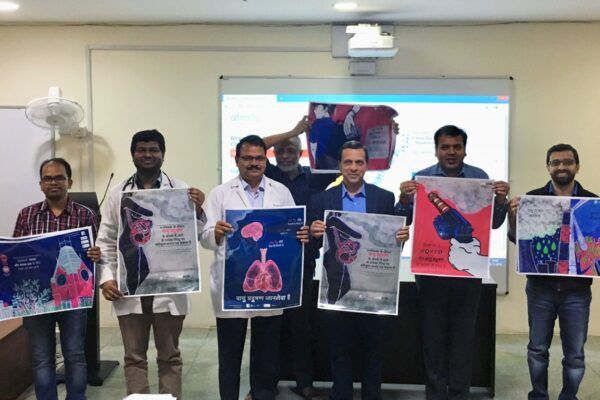Air pollution was the leading risk factor for deaths in India in 2019, accounting for nearly 18% of all deaths (more than 1.67 million). And 18% of these air pollution-attributed deaths are children under 5 (State of Global Air).
Sesame Workshop India (SWI) listened to this most vulnerable group and helped take their voices to those in power, through the ‘Mera Planet, Mera Ghar’ (‘My Planet, My Home’) initiative. We enabled cross generational exchange of ideas, expectations and solutions on environment, climate change and sustainable development. These are our insights on engaging and amplifying children’s voices to catalyse policy change.
Reaching and listening to the unheard
The first phase of ‘Mera Planet Mera Ghar’ was focused on recording the voices of young children and their views regarding the environment. In March 2021, SWI conducted a survey in association with Chintan, Child Survival India, Action India and PRATYeK across 28 low resource communities in Delhi-NCR, to understand the environmental concerns of 9,500 children aged 6-10 years. Partnerships were key for this outreach, as partners have the right expertise on certain areas and experience of working with children. Our partners educated parents and communities on the programme’s purpose to get their complete support to facilitate surveying children.
To gain insights into how young children perceived issues of environment, climate change and sustainable development, we worked with partners to ensure our survey methods were understandable to children. Children do not understand terms like environment or climate change, so the questionnaire and digital platform were tested with 150 children. This testing allowed us to improve the questionnaire’s ease of delivery, and gauge children’s understanding and the quality of responses. Volunteers were recruited and trained to approach children and facilitate the survey over WhatsApp, an accessible and commonly used platform.
The findings from the survey suggested that young children are aware of their surroundings, have definite views irrespective of age and understand how human action impact it. For the first time, the survey documented the voices of young children that are most often unheard or neglected by adults and decision makers. And they voiced a single demand: a clean and safe environment for all.
Platforming children’s voices
The second phase of ‘Mera Planet, Mera Ghar’ provided a platform for children to voice their environmental concerns based on the findings of the survey. The goal was to bring these children’s concerns directly to local stakeholders and ask them to support the children for a sustainable environment. This was to be undertaken in the form of children advisories and community events with the partnership of on-ground organisations.
The campaign engaged with almost 1,600 children on the ground in science-based experiments, fascinating stories, and weekly interactive workshops. These activities helped the children understand what can be done to keep the air clean, while also giving them a platform to share their environmental needs with their local leaders, audiences on social media and their communities. We used vox pops to capture children’s voices on environment issues on video. In the videos, Sesame Workshop’s popular muppet character, Chamki, interacted with 31 children and asked them probing questions. Using a character like Chamki can be meaningful for engaging and building awareness in communities, as the muppet interactions were positively received by the children, their parents and NGO partners.
Simultaneously, a citizen awareness and engagement drive was rolled out with Delhi adults aged 22-45 years on social media (Facebook and Instagram) and with press. The content for this included children’s asks for the stakeholders, awareness of air quality and how to take care of it, and voices of children from the community. The social media effort had wide-reaching effects with a primary reach of 5.6 million and 1.1 million video views. Children of Delhi were further engaged via YouTube with a special playlist focused on taking care of the planet and conserving our natural resources. The YouTube playlist garnered 237,000 views and 7,600 hours of watching.
Engaging with local stakeholders
To influence local authorities, we needed to directly present the children’s concerns to local political stakeholders. Based on the key demands in the survey, a demand charter was prepared and presented to elected community representatives in four virtual advisory meetings. These were attended by the Municipal Councillor and a Member of the Legislative Assembly (MLA), as well as 53 children. The area representatives gave the children a patient hearing and committed to taking necessary action. The stakeholders committed to meeting at least two of the demands put forth by the children.
As a follow up, local stakeholders were invited to an event to meet the children and listen to their environmental priorities. Various stalls were put up, with a group of children at each stall. The groups showcased their clean air activities to the stakeholders and other guests, which they learnt in the weekly workshops, like their proficiency with air quality index (AQI) monitor readings and what they indicate.
The events provided the right support and platform to the children to present their concerns and demand immediate solutions. The children also demanded accountability from decision makers, asked them to make environmentally sensitive decisions and lead change in their areas and communities.
Looking ahead
Policy change can be a slow process due to the multitude of complex factors involved. This means that consistent follow-up by partners is critical to ensure that stakeholders meet their commitments. It also necessitates strengthening networks with stakeholders to ensure their active participation.
In the next phase of our work, we aim to engage children in tackling the issue of waste management.

